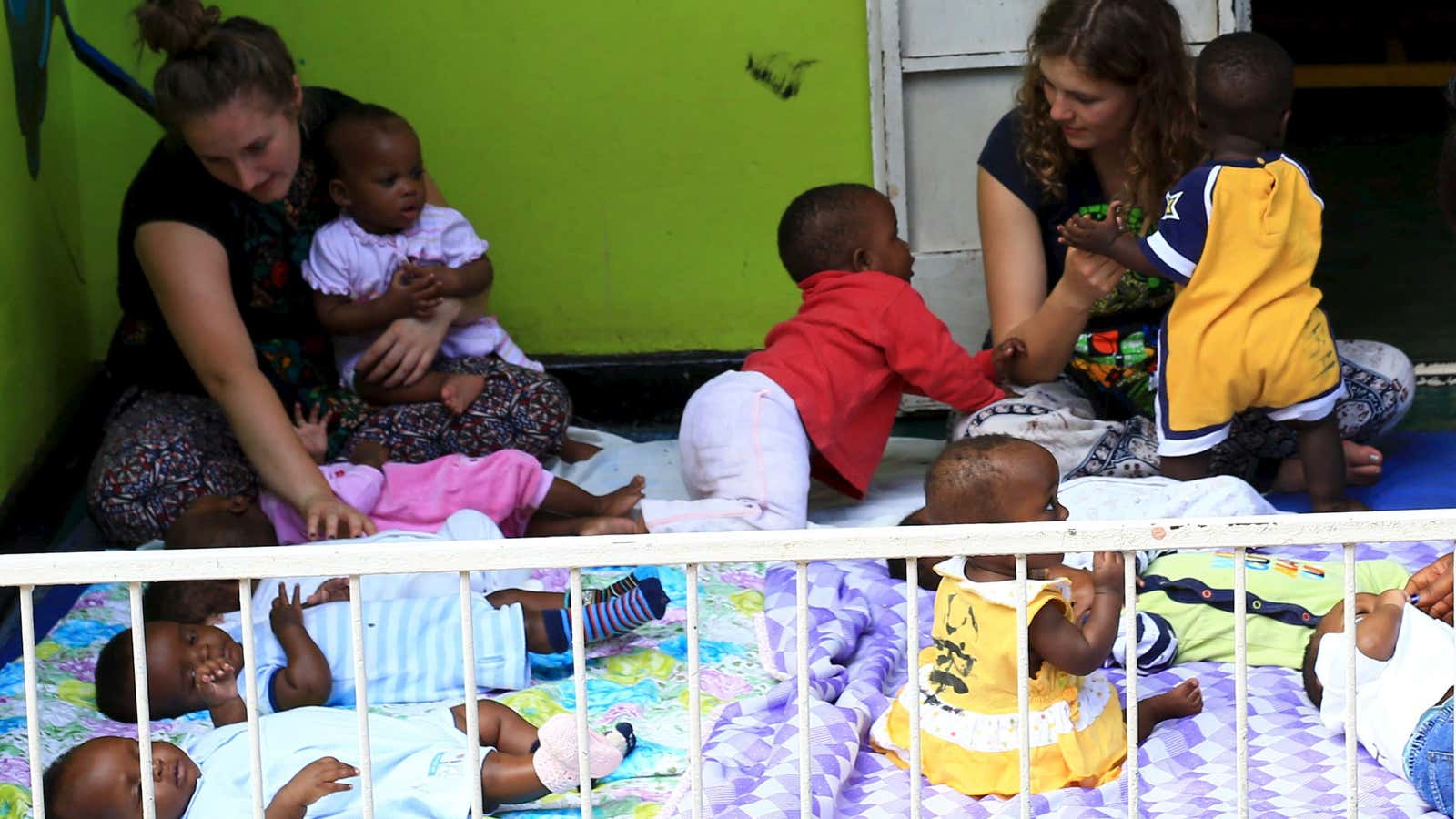The United States imposed financial sanctions and visa restrictions on two Ugandan judges, a lawyer, and her associate for taking part in a fraudulent adoption scheme where “young children were removed from their families and placed into a corrupt adoption network,” according to a statement from US secretary of state Mike Pompeo on Aug. 17.
The sanctions come after years of troubling revelations about Uganda’s international adoption system, including one in May by the British newspaper the Guardian which chronicled the struggle of a birth mother in Uganda to get back her child adopted by a family in the United States.
The US also has an indictment out against the lawyer, Dorah Mirembe as well as Margaret Cole and Debra Parris, two American employees of European Adoption Consultants (EAC), the agency which processed the adoptions but is now defunct.
The three women were charged in a 13-count indictment filed on Aug. 14 in the Northern District of Ohio for their alleged roles in schemes to “corruptly and fraudulently procure adoptions” of Ugandan children by bribing Ugandan officials and defrauding US adoptive parents, according to a statement from the US Department of Justice.
The indictment says the three women paid bribes to Ugandan social welfare officers in exchange for welfare reports recommending that children to be placed into orphanages without first ensuring the children were orphaned or that putting them up for adoption was in the children’s best interest. From there on they would pay bribes to Ugandan judges to obtain court orders placing those children in an orphanage, court registrars would assign the cases of these children to two corrupt “adoption-friendly” judges.
The adoption agency allegedly received more than $900,000 in these schemes and Mirembe herself over $400,000. Adoption of Ugandan children to the US were at highest in 2013 with 276 recorded; however, adoptions declined in 2018 to 26 and just 30 last year, mainly due to changes in the law in 2016. These “adoptions” cost between $15,000-$30,000 per child.
The schemes targeted parents giving them financial incentives and promised education for the children. In most cases the orphanages were said to be complicit.
While the US’ actions are primarily focused on protecting American citizens from being defrauded it will likely have an impact on disrupting the unsavory side of child adoptions, which have been enabled by individuals exploiting Uganda’s weak justice system. Despite some of these revelations being public for the last three years with parents speaking out, there has been no official state response to the families whose children were taken and no senior official has been held accountable.
In 2016, Uganda’s parliament passed a more stringent law on foreign adoptions, requiring would-be adoptive parents to stay at least one year in Uganda. However, with fraud involving justice officials, the law can easily be circumvented.
Uganda isn’t the only country to struggle with what is mostly seen as a form of child trafficking. In January 2018, Ethiopia banned foreign adoptions, and neighboring Kenya did so in 2014. There has been a decline in international adoptions globally but the US remains the primary destination.
“Illegal adoptions and scams target the most vulnerable people from poor socioeconomic backgrounds,” says Salima Namusobya, head of the Initiative for Social and Economic Rights in Kampala. “They face numerous socioeconomic barriers that maintain them in extreme poverty and therefore, unlikely to question any offers for help. Also, this keeps them from seeking justice once they discover the lies.”
This vulnerability once in contact with growing orphanage business fueled by “poverty tourism” industry inflicts untold suffering.
The 2019 ECPAT report puts a spotlight on orphanage “voluntourism” that has increased the targeting of low-income families for children to feed the orphanage industry boom. The number of children in orphanages increased from approximately 1,000 in the 1990s to more than 50,000 today.
“Many are primarily income-generating institutions—whose inmates still have living parents. In some cases, the free education, food, and clothing provided by orphanages may even motivate parents to send their children and separate them from their families,” read the report.
With little regulation, the Ugandan orphanages had put children at risk of trafficking, sexual exploitation, and other harms.
“Wider systemic socioeconomic failures in the country have resulted in widening inequality and exclusion,” says Namusobya. “There’s been a decline in government investment in social services and growing commercialization of key social sectors like education and health which would ideally provide safety nets and shield vulnerable groups from such scams.”
Social welfare activists say restrictions on foreign adoptions alone can’t tackle this problem because the answers lie in closing the inequality gaps and providing social safety for low-income families. Protection of children of low-income families requires urgent attention. More than half of Uganda’s population ( 57%) is under 18 and over half (56%) of them experience multidimensional deprivations and a low standard of living.
Sign up to the Quartz Africa Weekly Brief here for news and analysis on African business, tech, and innovation in your inbox




